Archived Water Damage Blog Posts
Flooded Basement Recovery: Trusted Services in Ebensburg, PA
10/1/2024 (Permalink)
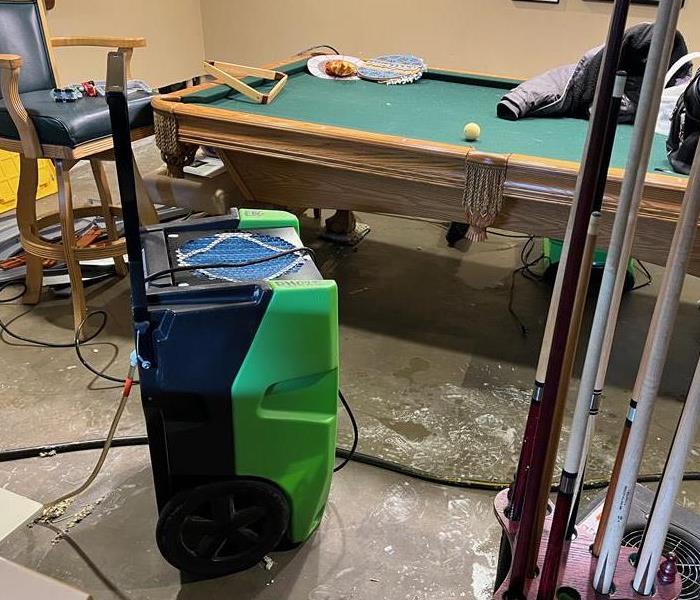 A flooded basement caused by a recent storm in Central Cambria.
A flooded basement caused by a recent storm in Central Cambria.
A flooded basement can feel like a nightmare, disrupting your life and causing immense damage to your property. Understanding the gravity of this situation is essential for homeowners, particularly in Ebensburg, PA, where heavy rainfall and storm events can cause flash flooding. The most important thing to know is that the impact of a flooded basement goes far beyond just the immediate mess; it can lead to structural damage, mold growth, and significant financial loss.
Many homeowners hold misconceptions about flooded basements, believing they can handle all aspects of cleanup themselves, many choosing to do so in order to save money. However, timely and professional water damage restoration is crucial in preventing further complications and ensuring a safe living environment. It's essential to recognize that not handling the problem properly can exacerbate the damages and ultimately cost you much more than doing it right the first time.
In this article, we'll explore the trusted services available in Ebensburg for flooded basement recovery. From identifying the warning signs that indicate the need for professional help to understanding the restoration process and its timeline, this guide will provide you with the knowledge and resources necessary to handle this challenging situation effectively.
Understand the impact of a flooded basement
A flooded basement can have a significant impact on your property. The immediate concern is water damage, which can compromise building materials and weaken the structure of your commercial property or home. Mold growth can quickly set in, posing health risks and further damaging surfaces. Important systems like sump pumps may fail, and equipment such as water heaters can be affected, increasing repair costs.
It is also worth mentioning the possibility of raw sewage, which can contaminate the space if the flooding is linked to a sewer backup. This requires a thorough water cleanup to prevent health hazards. If you have sewage in your basement, get professional help immediately.
Taking the right approach to water removal is crucial. Fast action minimizes damages from water and a professional water mitigation service ensures the water cleanup and drying process is done correctly, using appropriate water damage equipment. In Cambria County, frequent causes of basement floods include frozen pipe water damage and sump pump failure, both of which require urgent attention from leading water damage restoration specialists to prevent long-term issues.
Common misconceptions about flooded basements
Misconception 1: Minor Water Damage Isn't a Big Deal
Many homeowners in Ebensburg, PA, believe that small amounts of water are harmless. However, even minimal water intrusion can compromise building materials and spur mold growth, leading to more extensive repairs down the line.
Misconception 2: DIY Water Removal is Sufficient
While it's tempting to tackle water cleanup independently, without professional water damage equipment, it's challenging to remove all moisture. Incomplete water removal can cause further damage to hardwood floors, walls, and furniture.
Misconception 3: All Sump Pumps Prevent Flooding
Sump pumps are crucial, but they are not failproof. Sump pump failure is a common issue in Cambria County, and without regular maintenance, they can't adequately protect a basement from flooding.
Misconception 4: Water Damage Only Occurs from Flooding
Many believe that basements only flood from heavy rainfall or snowmelt. However, water damage can occur from frozen pipe water damage, water heater leaks, or even a water leak from appliances.
Misconception 5: Mold Growth Takes a Long Time
Another misconception is that mold takes weeks to develop. In reality, mold can start growing within 24-48 hours of water exposure, emphasizing the urgency of a prompt water removal process.
Importance of timely water damage restoration
The importance of timely water damage restoration cannot be overstated, particularly in regions like Ebensburg, PA, where incidents such as basement flooding can occur. Delays in addressing water damage can lead to further deterioration of building materials, mold growth, and even compromise the integrity of commercial property and residential spaces.
Below are key reasons to promptly engage water damage services:
- Preventing Structural Damage: Water can weaken foundations, cause hardwood floor water damage, and deteriorate other critical structural components.
- Mitigating Mold Risks: Moisture is a breeding ground for mold, which can pose health risks and damage surfaces.
- Protecting Health: Water damage, especially from raw sewage or floodwaters, can introduce harmful bacteria and allergens.
- Reducing Costs: Early intervention can minimize the scope of repairs, reducing overall recovery costs.
- Restoring Safety: Timely water cleanup ensures that buildings are safe and habitable for occupants.
- Maintaining Property Value: Professional water mitigation services help preserve the value of the property by preventing long-term issues.
For residents and business owners in Cambria County facing water loss due to sump pump failure, frozen pipe water damage, or weather-related flooding, partnering with leading water damage restoration specialists means swift water removal processes, use of advanced water damage equipment, and restoration of their environment to pre-damage conditions.
Preventing mold growth after water damage
Preventing mold growth is a critical step to consider after experiencing water damage in any area, particularly in a basement. Here are essential steps to help you avoid mold proliferation:
- Immediate Water Removal: As soon as you detect water damage, start the water removal process. Utilize pumps and wet vacs if available.
- Effective Drying: Post water extraction, use dehumidifiers and fans to dry out the affected space thoroughly. This process can take several days but is vital to stymie mold growth.
- Damaged Material Disposal: Remove and dispose of water-damaged building materials that cannot be fully dried, such as insulation, drywall, or carpet, as they can foster mold colonization.
- Cleaning and Disinfecting: Clean all surfaces with appropriate antifungal and antimicrobial solutions to kill any spores present and inhibit future mold growth.
- Monitor Humidity Levels: Keep the humidity in your home below 50% as a preventive measure, using a hygrometer.
- Inspect Regularly: Keep an eye out for any signs of mold in vulnerable places, especially after water incidents.
Remember, if you're recovering from significant water damage or facing persistent mold issues despite these efforts, it's essential to contact a professional water damage restoration company for expert mitigation services.
Key signs that indicate you need professional help
In the face of water damage within your Ebensburg, PA home, particularly a flooded basement, prompt recognition and action are vital. Here are key signs that demand the expertise of a professional water damage restoration company:
- Extent of Water: If the basement is flooded with several inches of water, it's time for professional assistance.
- Sump Pump Failure: A non-functional sump pump indicates immediate need for repair or sump pump installation expertise.
- Visible Mold Growth: The presence of mold suggests a potential health hazard and requires specialized mold remediation services.
- Water Source Disasters: Problems such as a burst water heater, frozen pipe water damage, or water main break necessitate a professional water removal process.
- Structural Damage: Signs of buckling floors or walls, especially hardwood floor water damage, mean the integrity of building materials is compromised.
- Water Contamination: If the water contains raw sewage or chemicals, specialized equipment and techniques are essential for safe cleanup.
Do not underestimate these indicators. Seek immediate services from leading water damage restoration specialists in Cambria County to mitigate long-term issues and ensure the safety of your residential or commercial property.
Sign
Indication for Professional Help
Water Level
More than minor pooling; extensive flooding
Sump Pump
Inoperative or overwhelmed
Mold
Visible growth, musty smell
Source of Water
Complex issues like burst pipes, sewage backup
Structural Damage
Compromised floors, walls, or supports
Contaminated Water
Presence of hazardous materials or waste
Remember, delays can exacerbate water damage issues and lead to additional costs.
Selecting a water damage restoration company
When selecting a water damage restoration company in Ebensburg, PA, it’s crucial to consider the following key factors:
- Expertise and Certification: Look for a company with certified technicians who specialize in water damage repairs, including complications like mold growth and hardwood floor water damage.
- Availability: A leading water damage restoration company must offer emergency water services, capable of responding promptly to sump pump failures or frozen pipe water damage.
- Equipment: Professional water mitigation services should possess advanced water damage equipment to handle the water removal process effectively.
- Experience with Local Issues: Knowledge of Cambria County's climate and infrastructure, such as sump pump installation requirements, is essential.
- Reputation: Research and select a company known for its expertise in dealing with raw sewage, water leaks, and various damages from water within commercial properties and private homes.
- Comprehensive Services: Ensure the company offers a range of services, from initial assessment to final restoration, including dealing with excess water and preventing future incidents.
Select a company that not only mitigates water loss but also assists in navigating insurance claims, maximizes the salvageability of building materials, and ensures complete restoration of your property to pre-damage conditions.
Benefits of 24/7 emergency response services
The #1 Restoration Company in Ebensburg, PA is SERVPRO of Ebensburg. One crucial service that they offer is 24/7 emergency response services. Here are the benefits of having access to round-the-clock professional aid:
- Immediate Assistance: Quick response is vital in preventing further damage to building materials and personal belongings.
- Mitigation of Mold Growth: Mold can start developing within 24-48 hours. Emergency services help in swift water cleanup to curb mold proliferation.
- Protection Against Raw Sewage: Flood waters can contain harmful bacteria from raw sewage, making prompt removal and sanitation necessary.
- Prevention of Structural Damage: Prolonged exposure to water can compromise the structural integrity of a property. Immediate action is key.
- Water Loss Management: Professionals can accurately assess the water loss and start the water removal process efficiently to minimize damage.
- Restoration Planning: An emergency service helps in quickly formulating a water damage restoration plan, leading to faster recovery.
- Comprehensive Solutions: Emergency teams are equipped with water damage equipment capable of handling sump pump failures, frozen pipe water damage, and water heater leaks.
By tapping into the expertise of the water damage restoration specialists at SERVPRO of Ebensburg, property owners in Cambria County can ensure a top-notch response to any water-related crisis.
What to expect during the restoration process
After contacting SERVPRO Team Weaver about water damage in a flooded basement in Ebensburg, PA, homeowners can expect a thorough and methodical restoration process. Here's what to anticipate during the procedure:
- Initial Inspection: SERVPRO technicians will evaluate the extent of the water damage, determining the source of the water, including any issues with sump pumps, water heaters, or frozen pipes.
- Water Removal: The water removal process begins swiftly using high-grade water damage equipment to mitigate further damages from water, including sump pump installation or repair in the case of sump pump failure.
- Drying: Commercial-grade dehumidifiers and air movers are deployed to dry out the affected area, safeguarding against hardwood floor water damage and mold growth.
- Cleanup and Sanitization: This includes clearing any raw sewage, contaminants and involves thorough cleaning of building materials.
- Restoration: Water damage repairs can range from minor replacements to major reconstruction of the affected areas.
Throughout the process, the professionals at SERVPRO Team Weaver will ensure effective management of excess water, safeguarding both residential and commercial properties in Cambria County from the long-term impacts of water loss. It is essential to address water leak and water damage issues promptly to prevent structural damage and health risks associated with mold and mildew.
FAQs
What should I do immediately after discovering a flooded basement?
Upon discovering a flooded basement, take immediate steps to ensure safety and limit the damage. First, avoid entering the basement if you suspect electrical hazards or if there is a risk of raw sewage contamination. Disconnect power to the area if possible. Reach out to a professional water damage restoration company who can conduct an emergency water removal process. It is advisable to document the extent of water damage for insurance purposes. While waiting for help, if it's safe, you can begin removing belongings to prevent further damage. Always prioritize safety and never risk exposure to potential electrical hazards or contaminated water.
How long does it take to restore a flooded basement?
The duration of restoration for a flooded basement varies widely depending on the severity of the damage, the source of water, and the efficiency of the response. Typically, water removal and drying may take anywhere from a few days to a week. The complete restoration process, which includes repairs or reconstruction of building materials, could extend from a week to several weeks. Working with leading water damage restoration specialists equipped with advanced water damage equipment can expedite this process. A realistic timeline, considering all aspects of water damage repairs, will be provided by the restoration service after the initial assessment.
What should I do immediately after discovering a flooded basement?
Upon discovering a flooded basement in Ebensburg, Pennsylvania, it is crucial to act promptly to mitigate the water damage:
- Safety First: Immediately shut off the electricity to prevent electrical hazards. If you can't safely reach the breaker, call an electrician.
- Stop the Water: If the flood is due to a burst pipe or water heater malfunction, turn off the house's main water valve.
- Sump Pump Check: Inspect the sump pump for failure and, if operational, ensure it's actively removing water. If not, a sump pump installation or repair may be necessary.
- Document Damage: Take photos or videos of the water damage for insurance purposes before any water cleanup begins.
- Contact Professionals: Reach out to a leading water damage restoration company that specializes in water damage services, including water removal, to handle emergency water issues such as excess water, frozen pipe water damage, and mold growth.
- Protect Valuables: Move undamaged items to a dry area to prevent further damage.
- Insurance Notification: Notify your insurance company of the damages from water to start the claims process.
Immediate action using professional water mitigation services is key to preserving the integrity of your property and mitigating the risks associated with water damage in Ebensburg, PA.
Call SERVPRO of Ebensburg today at (814) 472-0800 to make it Like It Never Even Happened.™
The Water Damage Inspection Process in Ebensburg, PA
10/8/2023 (Permalink)
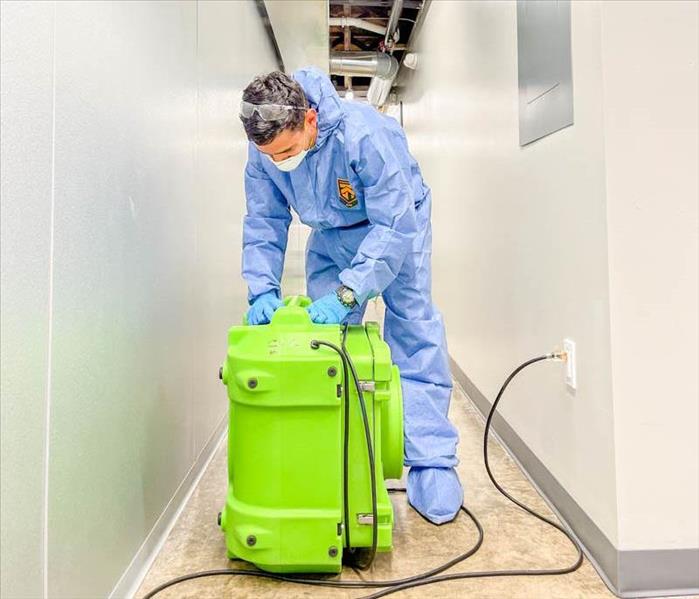 Our goal is to minimize the disruption caused by water damage and restore your property to its former glory.
Our goal is to minimize the disruption caused by water damage and restore your property to its former glory.
Water damage can be a stressful and disruptive event for homeowners and business owners alike. When facing water damage, one crucial step in the restoration process is the initial inspection. In this blog, we'll take you through what to expect during a water damage inspection, helping you gain clarity and peace of mind during a challenging time.
1. Prompt Response
When you contact SERVPRO® for a water damage inspection in Ebensburg, PA, our team understands the urgency of the situation. We strive to provide a swift response to assess the damage promptly. This quick action is essential to prevent further damage and ensure a faster recovery process.
2. Thorough Assessment
Our trained professionals will conduct a thorough assessment of the affected area. This includes identifying the source of the water intrusion, assessing the extent of damage to structures and contents, and evaluating the potential risks involved.
3. Moisture Detection
Advanced moisture detection tools will be used to identify hidden pockets of moisture that are not visible to the naked eye. Identifying and addressing these areas is crucial to prevent mold growth and further damage.
4. Damage Documentation
During the inspection, we'll document the damage extensively. This documentation includes photographs, written notes, and detailed reports. This documentation is vital for insurance claims and the restoration process.
5. Safety Assessment
Ensuring safety is a top priority. Our team will assess potential hazards, such as electrical risks or structural instability, to create a safe working environment for both our team and the property occupants.
6. Initial Drying Measures
To prevent further damage, we may implement initial drying measures during the inspection. This can include removing standing water and setting up drying equipment like dehumidifiers and air movers.
7. Restoration Plan
Based on the inspection findings, our team will develop a customized restoration plan. This plan outlines the necessary steps to restore your property to its pre-damage condition and includes estimated timelines and costs.
8. Communication and Transparency
Throughout the inspection process, we prioritize clear and transparent communication. We'll explain our findings, answer your questions, and keep you informed about the next steps in the restoration process.
Facing water damage in Ebensburg, PA, can be overwhelming, but knowing what to expect during a water damage inspection can provide clarity and help you take the first steps toward recovery. At SERVPRO® of Ebensburg, we are committed to delivering expert inspection and restoration services to the Ebensburg community. Our goal is to minimize the disruption caused by water damage and restore your property to its former glory. If you ever find yourself in need of a water damage inspection or restoration services, don't hesitate to reach out to our SERVPRO® of Ebensburg team, your trusted partner in property restoration.
Detecting Shower Leaks: Signs to Watch Out For
7/27/2023 (Permalink)
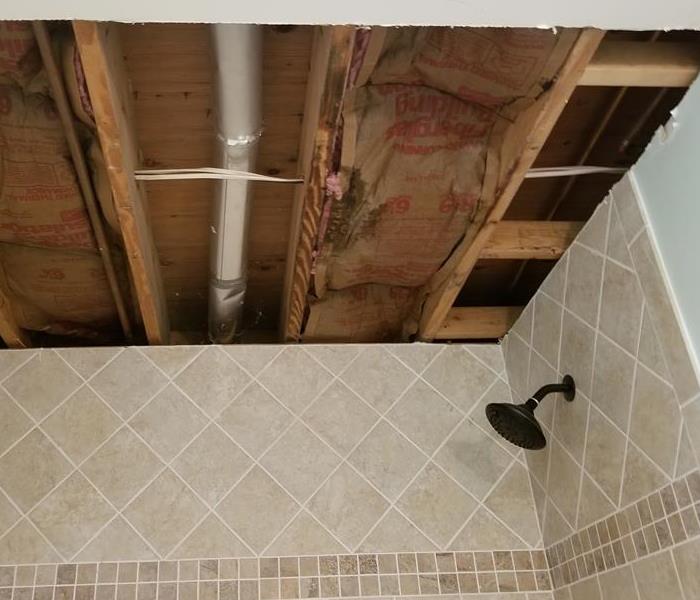 Detecting a shower leak early can help prevent water damage.
Detecting a shower leak early can help prevent water damage.
Shower leaks can be sneaky and often go unnoticed until they cause significant damage. Identifying a shower leak early is crucial to prevent water damage, mold growth, and costly repairs. In this blog post, we'll explore some telltale signs that can indicate a shower leak, helping you take prompt action and mitigate potential issues.
Visible Water Damage
Water stains or discoloration on walls, ceilings, or floors near the shower area are clear indicators of a possible leak. Look for peeling paint, bubbling wallpaper, or warped baseboards. These signs suggest that water is seeping into areas where it shouldn't be.
If you hear constant dripping or running water sounds even when the shower is turned off, it's a strong indication of a leak. Pay attention to any unusual noises coming from the shower or adjacent walls, as they could be a result of water escaping through gaps or cracks.
Mold or Mildew Growth
Excessive moisture from a shower leak can create an ideal environment for mold and mildew to thrive. Keep an eye out for black or greenish patches, musty odors, or a dank smell in the bathroom. Check corners, grout lines, and any porous surfaces for signs of mold or mildew growth.
A shower leak can cause damage to the flooring materials, especially if they are porous or not properly sealed. Look for tiles that feel soft, discolored, or loose near the shower area. Warped or buckled floorboards or laminate flooring can also indicate water damage.
Decreased Water Pressure
If you notice a sudden decrease in water pressure when using the shower, it could be due to a leak in the plumbing system. Leaks can disrupt the water flow and affect the pressure coming out of the shower head. Monitor any significant changes in water pressure and investigate the cause.
Keep an eye on your water bills. A hidden shower leak can lead to a gradual increase in water usage, resulting in higher bills without any apparent explanation. If your water consumption seems unusually high, it's worth investigating the possibility of a leak.
Cracked or Loose Grout and Caulking
Inspect the grout lines and caulking around the shower tiles. Cracked, crumbling, or missing grout can allow water to penetrate the walls or floor. Similarly, deteriorated or loose caulking around the shower fixtures or joints can contribute to water leakage.
If the shower shares a wall with an adjacent room, pay attention to any signs of wetness, discoloration, or softened drywall in that area. Moisture seeping through the wall from a shower leak can affect the integrity of the drywall and lead to further damage.
Persistent Odors
A shower leak can create a damp environment that produces unpleasant odors. If you notice persistent musty or moldy smells in the bathroom, even after thorough cleaning, it could be a sign of hidden water damage caused by a leak.
After taking a shower, observe the area around the shower stall or tub. If you notice water pooling on the floor or standing in areas where it shouldn't be, it indicates a leak. Proper drainage should prevent water from accumulating outside the designated shower area.
Detecting a shower leak early is crucial to prevent extensive water damage and costly repairs. By paying attention to the signs mentioned above, you can identify potential leaks and take prompt action. If you suspect a shower leak, it's advisable to consult a professional plumber or contractor to assess and resolve the issue. Remember, addressing a shower leak promptly not only protects your property but also ensures a healthy and functional bathroom environment.
Causes of water in the crawl space
3/12/2023 (Permalink)
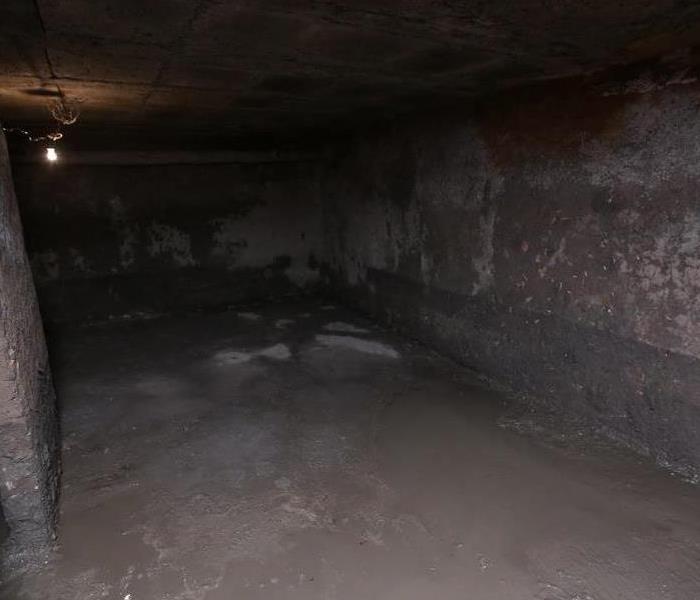 When your crawlspace suffers from a water loss, give the professionals a call today.
When your crawlspace suffers from a water loss, give the professionals a call today.
If you're having a problem with water in your crawl space, the first thing you need to do is identify the source of the moisture. The most common causes of moisture problems in a crawl space are water leaks.
Cause of Loss
Water leaks are the most common cause of crawlspace water damage. Water leaks can come from the home's foundation walls and slab, or from condensation on cold surfaces. Rising dampness due to excessive soil permeability, also know as high level of porosity in the soil. Any combination of these factors can be responsible for moisture problems in your crawlspace. It's best to have a professional do an inspection with an infrared camera so they can pinpoint where exactly there's an issue with your home's drainage system and how it was caused.
Identify the source
The first step in dealing with a moisture problem in your crawl space is identifying the source of the moisture. If you have an infrared camera, use it to locate where water is leaking into or out of your home through walls and floors. Repair or replace damaged areas as necessary, but if you can't find a specific point of entry for water leakage (or if there are too many sources), it may be worth considering crawl space encapsulation. Crawl spaces are notorious for having poor air circulation and high humidity levels, both conditions that make for ideal breeding grounds for mold spores and other harmful contaminants.
Crawl space encapsulation involves sealing up all openings between rooms within a house so that only one room has access to the outdoors, our basement. This means removing windows from basements so they don't leak into other parts of homes, installing double doors between basements/attics/roofs, sealing up cracks around pipes going into these rooms.
A high level of porosity in the soil.
A high level of porosity in the soil means that it can absorb and hold water. Soil porosity is affected by the size and shape of soil particles, as well as their distribution within the soil. The amount of organic matter present also plays a role in determining how much moisture will be held by the soil.
Excessive soil permeability is a common problem in crawl spaces because these areas tend to have large amounts of loam or clay that contain many fine pores which allow for rapid drainage through capillary action (the movement of liquid through narrow spaces).
Infrared Camera
The best way to identify and correct a moisture problem is by using an infrared camera to locate its source. Infrared cameras detect the minute changes in temperature that occur when water is present, making it possible to find hidden sources of moisture without having to dig up the entire crawlspace. This can save time and money, since you won't need to hire a contractor for large excavation jobs if there's only one area with high levels of moisture (like when there are pipes running through the floor).
If you think you may have a moisture problem in your crawlspace, it's important to get it checked out by a professional. The best way to do this is by using an infrared camera. This device can identify the source of moisture in your home, so that you can take the appropriate steps towards fixing it and preventing future issues from occurring.
Insurance and Water Damage
2/10/2023 (Permalink)
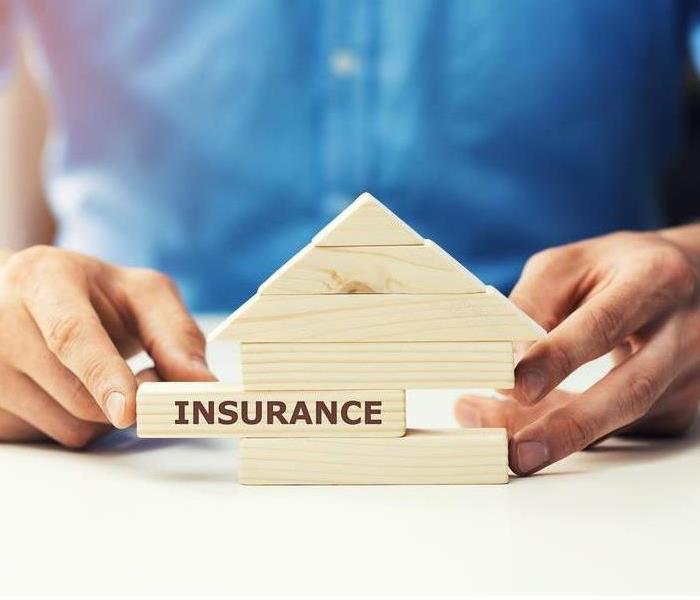 Is your water damage covered by insurance?
Is your water damage covered by insurance?
Water damage is a common occurrence that can occur at any time. When water gets into your home or business, it can cause everything from mild cosmetic damage to expensive structural damage. Your insurance policy may cover some types of water damage, but there are many types of water-related incidents that aren't covered by standard policies. Knowing the difference between what's covered and what isn't can help you prepare for any eventuality.
What’s Covered?
If you have suffered from any type of water damage, whether it's from floods, burst pipes or frozen pipes, you may be eligible for coverage under your homeowners insurance policy. Flood waters and storm damage can affect your entire house.
Sewer backup is also a common problem coming from a clogged drain or a cracked pipe. Water can collect in your house basement without proper drainage. If sewage backs up into your home, you need to call a plumber immediately. Most homeowners and renters insurance policies cover sewer backups caused by septic system failure or backed-up municipal sewers.
Some water damage falls into an insurance "gray area."
Some water damage falls into an insurance "gray area." While your policy may cover some types of water damage after an accident, it may not cover damage caused by lack of maintenance in your home or apartment. For example, if you forget to clean out your gutters in the fall, your roof and eaves may not be able to withstand the burden of snow and ice during the winter. This could cause water damage — but it's not accidental, and so it would not be covered by your insurance policy.
That being said, don't worry too much about these kinds of things! Insurance companies have plenty of experience dealing with claims like these--you'll probably get plenty of help navigating them from them when they come up!
Having home or business serviced by professionals that are certified both in remediation (restoration industry standard) and reconstruction will help ensure complete coverage from floor to ceiling as well as outside grounds or lot.
SERVPRO in Ebensburg is locally owned and operated and IICRC certified for water damage restoration and building construction & restoration. Being certified is important because it ensures you're working with professionals who are trained in the most up-to-date methods and techniques. You can also rest assured that your property will be restored to its preloss condition, which means that if you want to sell your home or business at some point in the future, you'll have peace of mind knowing it will look just as good as it did before water damage happened. IICRC certification isn't just about making sure customers get high quality workmanship, it's also about protecting their investment by ensuring they receive full coverage under their insurance policy. As a result, when choosing a restoration company for any type of water damage clean up job - whether residential or commercial - make sure they're certified by asking them directly!
If you are looking for a water damage restoration company, SERVPRO of Ebensburg is here to help. We have been providing quality service to our community and we have the knowledge and experience needed to make sure your property is restored back to normal as quickly as possible. For more information, give us a call today!
A Serious Problem: A Leaky Roof
1/23/2023 (Permalink)
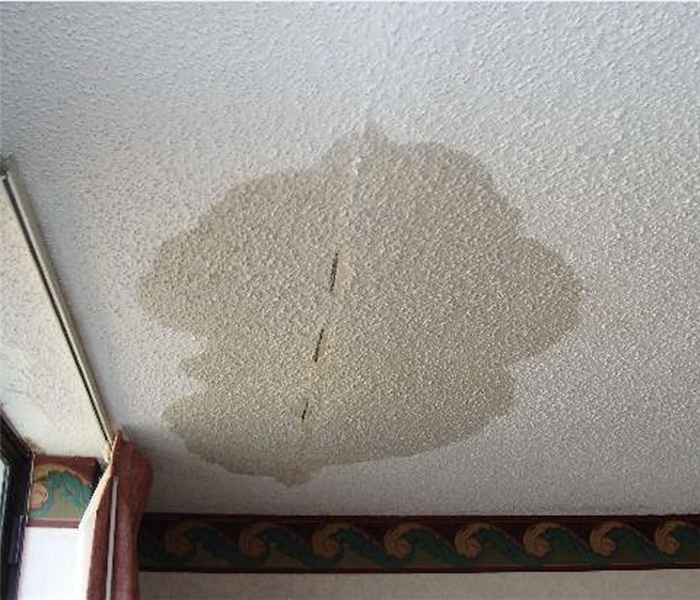 If you suspect that your roof is leaking or has developed a leak, give us a call today!
If you suspect that your roof is leaking or has developed a leak, give us a call today!
A roof leak is when water enters your home through the roof. While it may not sound serious, a roof leak can lead to mold and other potential hazards. Roof leaks are commonly caused by damaged and missing shingles, missing or worn-out flashings, and improperly flashing windows or skylights. Regardless of the reason for the roof leak, the leak can lead to mold, which can be problematic for the structure of the home.
How to Tell If Your Roof Is Leaking
To determine if your roof is leaking, here are some things to look for:
- Discoloration of the ceiling and/or walls. This can be caused by water that has run down a wall or dripped on a surface.
- Damp spots on ceilings or walls. If you are able to locate damp spots, use an absorbent cloth to dab up any remaining moisture from these areas.
- Water stains on ceilings and/or walls (indicates prolonged wetness). If you see water stains, look for additional signs of leakage such as discoloration in those areas. Water stains may also indicate mold growth behind drywall where it's difficult to access without damaging interior surfaces such as drywall and flooring.
Roof Leaks and Mold
Mold can cause structural damage to your roof. This means that mold is eating away at the wood and other material in your roof, causing it to rot. Mold can also cause a roof leak. If you find mold growing around where water collects on your roof, there's a very good chance that this is what caused the leak in the first place. Molds are also notorious for being able to eat through tar paper and shingles as well as some other types of materials used for roofs; if you see any type of discoloration or peeling on these surfaces then there's probably mold underneath those areas too!
Preventing Mold
Keep your roof clean. It's a good idea to have someone conduct an inspection of your roof every year, especially if it's made of a material that can easily become moldy (like wood). Make sure there aren't any leaks in the attic or other areas of the home. If you find one, get it fixed right away!
Clean out gutters and downspouts regularly so that water flows freely from them. This will help prevent water from pooling on the roof and leading to mold growth.
If possible, insulate your attic to keep moisture levels low inside of it. If you live in an area with high humidity during certain times of year—like summer—you may want to consider using a dehumidifier while sleeping or spending time indoors during these months as well; this will help keep air circulating freely throughout your home instead of trapping moisture inside walls where it might cause problems later down the road!
Talk to an expert about your roof's overall condition.
The best way to figure out if you have a mold problem on your roof is to have an expert inspect it. Make sure that you hire someone who can take samples of the mold and evaluate them for potential health risks. If there are any signs that the mold could be toxic, call in professionals who specialize in cleaning up contaminated buildings, like SERVPRO of Ebensburg, as soon as possible.
While leaks in your Ebensburg home can be a source of stress, it’s important to remember that you don’t have to deal with them alone. Our expert team is here to help! If you suspect that your roof is leaking or has developed a leak, give us a call today!
What Are the Three Different Kinds of Contaminated Water?
11/8/2022 (Permalink)
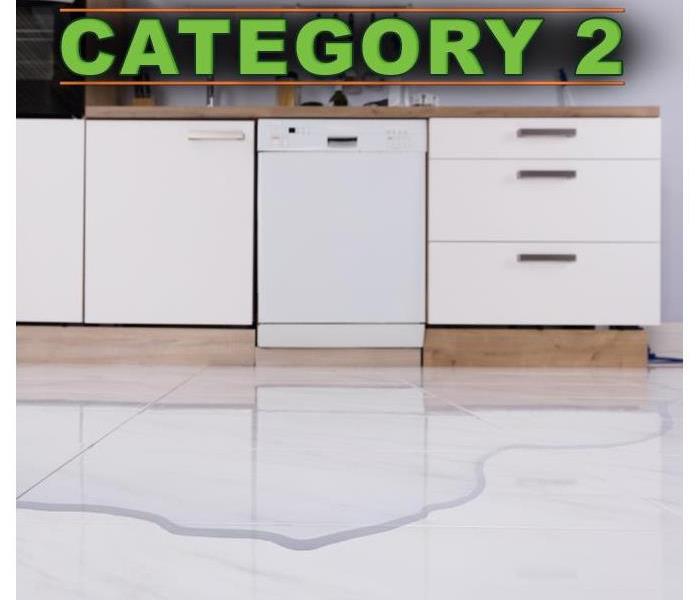 A spill from the dishwasher could be considered Category 2
A spill from the dishwasher could be considered Category 2
What Are the Three Types of Contaminated Water?
An emergency water damage event can be devastating to the home or business and sometimes it’s not possible to avoid it. If you have a flood, it’s important to know who to call and when.
It’s important to know the difference between the three types of water contamination. If you don’t, you could end up with a bigger problem than you expected.
There are three types of water contamination: biological, chemical, and radioactive contamination.
Each type requires different steps for treatment and cleanup so it is important to know how to recognize each one if you find yourself working in an area where contaminated water may be present.
Biological Contamination is caused when there are living organisms in a body of water or liquid (like milk or juice). These can include bacteria, viruses, parasites like worms and amoebas which make people sick if they get into their bodies through food or drink that contains them; therefore this type can occur anywhere that humans live near water sources such as lakes and rivers but it's most common at large-scale events where thousands upon thousands of people attend without proper sanitation facilities nearby like bathrooms/toilets etcetera - because then they have no choice but use whatever source they have available nearby instead - which often leads
Category 1 - Clean Water
Unsanitary water sources known as Category 1 (clean water) would be from a clean supply line, such as your sink or bathtub. This is called category 1 water. It is safe to use for cleaning and washing, but it is not recommended for drinking due to the lack of purification treatment.
Category 2 - Gray Water
Category 2 (contaminated) is gray water. Gray water can be discharged due to a dishwasher, washing machine flood, or even an overflowing toilet that only contains urine.
Gray water is not safe to use for drinking or cooking because it may contain some dangerous chemicals or components:
- Fecal coliform bacteria and other organisms from human waste
- Chemical pollutants used in laundry detergents, household cleaners, and personal care products such as shampoo and soap
Category 3 - Black Water
Black water requires special attention because it often contains harmful bacteria and pathogens. It's called black water because it is not clean, and it should never be ingested. If you've found yourself in a situation where your home or business is flooded with this kind of water, you need to call the professionals at SERVPRO of Ebensburg immediately and avoid the area.
If you find your Ebensburg, PA home or business flooded with any kind of water — you need professionals on the job to take care of the mess and restore your home or business to its original, preloss condition. SERVPRO of Ebensburg is here to help make that process as easy and painless as possible. Give us a call!
Cleaning Up an Overflowing Toilet
7/19/2022 (Permalink)
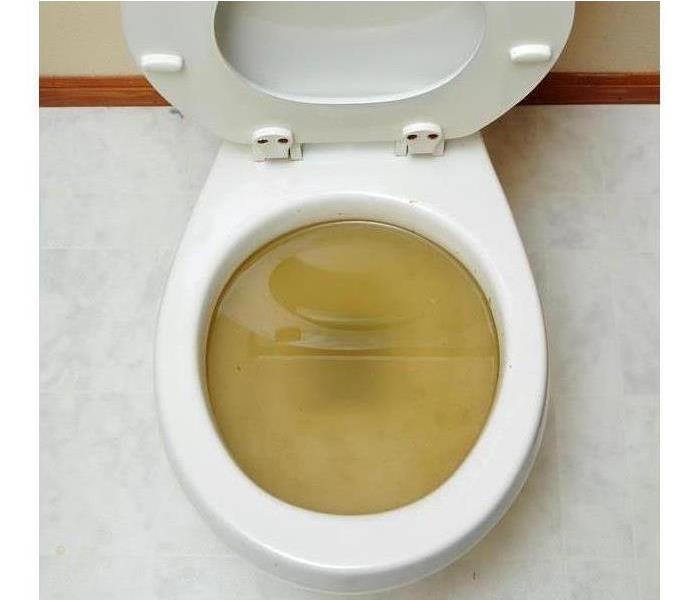 An overflowing toilet is a disastrous sanitary issue that can potentially cause massive amounts of damage
An overflowing toilet is a disastrous sanitary issue that can potentially cause massive amounts of damage
Follow The Steps Below If You Have An Overflowing Toilet
An overflowing toilet is a disastrous sanitary issue that can potentially cause massive amounts of damage. Preventing the sewer damage from reaching other areas of your house is key to keeping damage at a minimum. Quickly follow the steps below if your home in Belsano, PA, has an overflowing toilet.
1. Stop the Overflow.
Lift the lid from the back of the flooded toilet and press down on the rubber valve to close the tank. Then lift the float to stop more water from entering the toilet bowl. Turn the valve at the back of the toilet clockwise to completely shut off the water supply.
2. Mop Up the Spill.
Quickly mop up the standing water on the bathroom floor to prevent liquid sewer damage. Once you finish, wring the mop out into an empty bucket.
3. Unclog the Toilet.
Try using a plunger to dislodge the clog first. If this doesn't work, you can opt to use a closet auger instead. To do this, insert the auger so the curve of its tip faces the same direction as the drain. Crank the auger as far as you physically can in both directions to dislodge the clog. Carefully pull the auger out before switching back to a plunger. If these steps aren't successful, call a plumber.
4. Discard the Toilet Waste.
If, and only if, you were successful in Step 3, pour the contents of the mop bucket back into the toilet and flush. Use hot water to rinse and clean the mop and the bucket.
5. Sanitize the Area.
Create a cleaning solution using a gallon of hot water, and 1 cup of bleach. Use this solution to scrub and sanitize any area that came into contact with the toilet water. Wear rubber gloves to protect your skin during this process.
Sewer damage caused from toilet overflow can wreck havoc on your residential bathroom. After you finish cleaning the bathroom, you need to contact either a sewage company or water remediation professionals to help resolve the damage.
Getting Ready for Your Insurance Adjuster's Visit After Water Damage
5/23/2022 (Permalink)
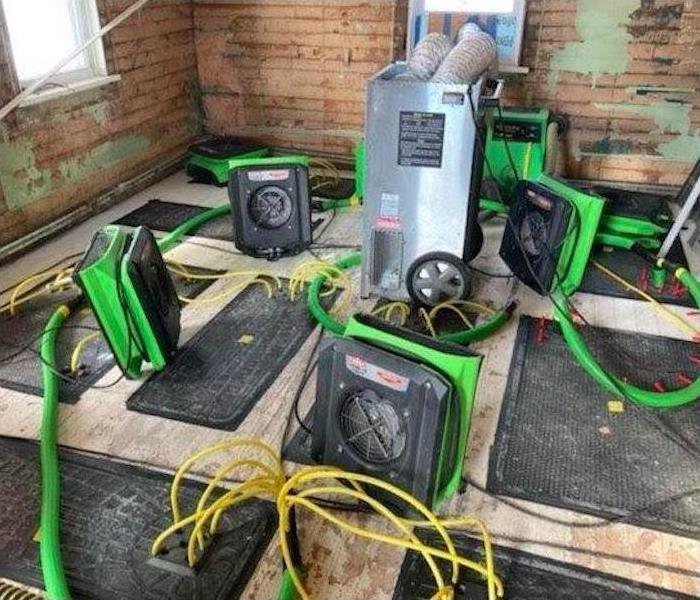 Drying equipment running in a Cresson, PA home.
Drying equipment running in a Cresson, PA home.
Water Damage In Your Home- What To Do?
You've experienced water damage in your Cresson, PA, home. Now, what do you do? After ensuring everyone is safe, it's time to call your insurance company.
What Your Home Insurance Policy Covers
Your agent will review your policy and determine if the damage is covered. Generally, your standard home insurance policy covers water damage from a peril causing sudden, immediate damage, such as:
- Burst water pipe
- Water heater leak
- Roof leak from a storm
It will not cover damage from flooding or poorly maintained plumbing.
Preparing for the Home Adjuster Visit
Your policy has a specified amount of time for you to file an insurance claim. Once you open a claim, your adjuster visits your residence to assess the damage. It's a good idea to prepare for the visit so that it will be productive and efficient.
First, make temporary repairs to prevent further damage. You can hire a contractor to make these fixes or do them yourself. Save your receipts so that you can turn them in as expenses. Your insurance can help you pay for professional water damage restoration.
Remember that because the money you spend on temporary repairs counts toward the amount of your total settlement, you don't want to overspend.
Collect as much information as you can about your damaged belongings:
- A description of the items
- Dates of purchase
- What it will cost to repair or replace the items
Give the information to the home adjuster and any receipts you have.
Find structural damage that you can show the adjuster. You may have damage to walls, floors or ceilings. Your electrical system may also need repairs. If you already have contractor bids, give copies to the adjuster.
Keep copies of all paperwork for yourself: receipts, bids, insurance information, etc.
Water damage is no fun, but preparing for a visit from your home adjuster can help you get through the claims process quickly and easily.
Top 3 Causes of Water Loss
3/7/2022 (Permalink)
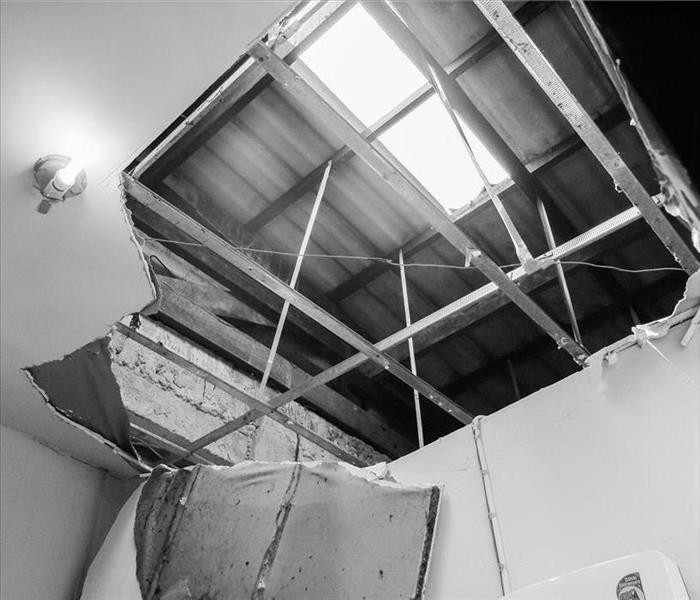 The ceiling was damaged due to a roof leak.
The ceiling was damaged due to a roof leak.
Common Causes of Water-Related Losses for Businesses
Damaged pipes in your East Conemaugh, PA, business and having to hire water remediation professionals can rain on your parade. Not only will you lose time that you could be working, but you will also have to replace valuable equipment and inventory. This can result in a lot of loss for your business. Here are some of the common causes of water-related losses for businesses and how to avoid them.
1. Equipment
Any equipment that uses water is putting your business at risk since it uses potentially damaged pipes. HVAC units, water heaters, and any other appliances in your business all have pipes that can leak. If leaking pipes occur when your company is closed, you can come back to find some serious damage. To avoid this type of damage, you need to perform regular maintenance on your equipment. Notice any rust, cracks, or bulges in your pipes as these are signs of moisture. Also, be sure to replace your water lines regularly. Then, recaulk and reseal the hoses to prevent issues and loss.
2. Roof Leaks
The only thing worse than damaged pipes is a roof leak. If you find a pond on your roof, you have a drainage problem. This is literally weighing down on your business. Over time, your roof will buckle under the strain and start to leak. To avoid roof leaks, regularly check your flashing, roofing, and drainage. If these become clogged or deteriorate, you are setting yourself up to experience serious loss.
3. Plumbing Issues
Your plumbing system can experience clogs and other damage. Cracks are a serious problem that can lead to leaks and excessive loss. To avoid serious issues, check your pipes regularly for stains, rust, cracks, and bulges. Also, perform regular maintenance to avoid clogged pipes that can lead to serious losses.
Any business is at risk of loss due to flooding and water damage. Fortunately, there are measures you can take to avoid water-related losses.
How to Keep Pipes from Freezing When the Temperature Drops
1/29/2022 (Permalink)
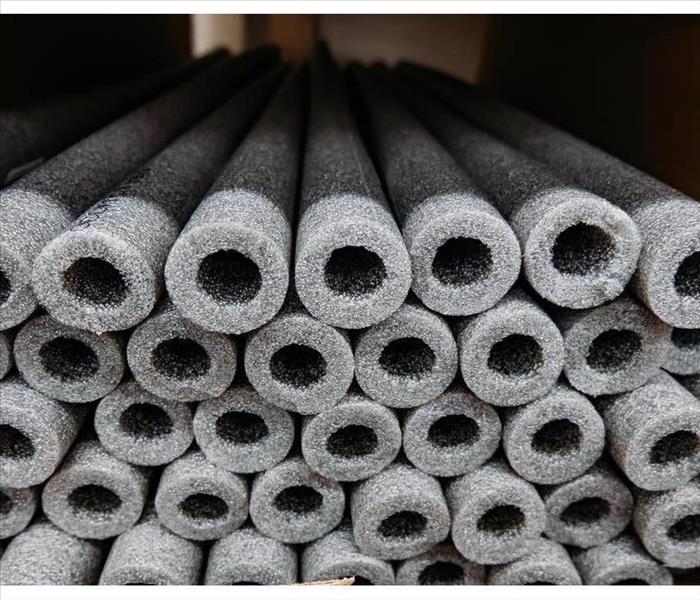 Make sure to insulate your pipes.
Make sure to insulate your pipes.
Prevent Your Pipes From Freezing
When the temperature drops in Portage, PA, you probably remember to protect yourself and your loved ones, but have you remembered to protect your home? Unless you’ve taken necessary precautions, cold temperatures can cause pipes to freeze. This is a problem for two primary reasons:
- Frozen pipes prevent the flow of water.
- Pipes that are frozen can eventually burst, making water line repair necessary.
It is important to remember that all types of pipes can freeze, including copper, plastic, and steel. The following tips will help you prevent your pipes from freezing.
Turn on the Heat
Everyone knows that leaving the heat on makes for an expensive heating bill, but that heating bill can be a lot cheaper and less of a pain than frozen pipes that burst and cause flooding. While you might want to tough out the cold with a down comforter and mittens, your pipes need to stay warm, so keep the heat set no lower than 55 degrees Fahrenheit.
Open the Cabinets
Turning on the heat won’t help much if your pipes are hidden away in heavy cabinets. Prevent pipes from freezing by opening cabinet doors where there are pipes to allow heat to circulate around your pipes. It might not look as nice to have everything open, but you’ll be happy when the pipes don’t freeze.
Insulate Pipes in Unheated Areas
If you have pipes in unheated areas of the house, like the garage or crawl spaces, or against uninsulated outside walls, make sure to insulate those pipes. Heat tape can be useful, but make sure to read the directions so you know whether you will need to manually plug and unplug the tape to heat the pipes, or if it will regulate temperature automatically. You can also add extra insulation in the form of foam rubber or fiberglass sleeves.
When freezing temperatures come to Portage, PA, make sure to protect your home from frozen pipes. If your pipes do freeze and burst, a SERVPRO professional can help with the cleanup.




 24/7 Emergency Service
24/7 Emergency Service










